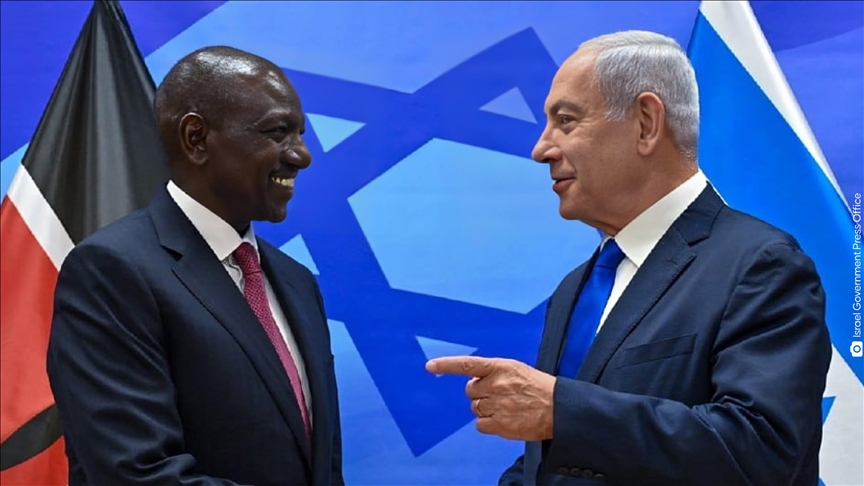Will Kenya change tack on supporting Israel?
NAIROBI, Kenya
While Israel’s main benefactors during its ongoing war on Gaza have been major Western nations, it has also found support in parts of the African continent, including the East African nation of Kenya.
The Kenyan government has consistently backed Israel with words and diplomatic actions, including votes at the UN, despite a clear divide in public opinion within the country.
This support is rooted in diplomatic relations dating back to the 1960s, but the two countries have deepened ties in various sectors over the years, including security, technology and agriculture, while Israel is also viewed as a strategic counterterrorism ally in East Africa.
Kenya’s relationship with Israel has existed “long before it became official,” going back to the days when apartheid still plagued South Africa and many African nations were vocally opposed to Israel, according to Herman Manyora, a political analyst and University of Nairobi lecturer.
“Kenya has a very interesting relationship with Israel. Long before this relationship became official, when Israel was not recognized by most of Africa, Kenya had silent relations with Israel and apartheid South Africa,” he told Anadolu.
However, while Kenya “came out strongly in support of Israel” after the Hamas-led Oct. 7 attack, the government was forced to “quickly retract, seeing as it wasn’t sitting well with many African countries,” he said.
On multiple occasions, the Foreign Ministry issued statements condemning rocket attacks on Israeli cities, framing Israel’s military response as legitimate self-defense, while President William Ruto has reaffirmed that Kenya views Israel as a “great friend.”
Divisions within
Kenya’s close relationship with Israel has, at times, drawn muted criticism within Africa, particularly when it comes to Nairobi’s diplomatic support to Tel Aviv.
On several resolutions brought before the UN General Assembly and Human Rights Council condemning Israel’s actions in Gaza, Kenya either abstained or voted against the motions, aligning with Western powers.
Standing with Israel, which is accused of genocide at the International Court of Justice (ICJ), has made Kenya an outlier in Africa.
Esther Mwai, a political analyst based in Nairobi, said Kenya “has suffered negatively across Africa” because of its support to Israel.
“Many African countries have traditionally supported Palestine, and Kenya’s position placed it at odds with the broader African consensus,” she said.
Public opinion within Kenya is also divided as many feel a strong sense of solidarity with the Palestinian cause, seeing parallels between their struggle and Africa’s own historical battles against colonialism and oppression.
“I’m disappointed that our government continues to support Israel despite the atrocities being committed in Gaza,” said Movicks Ogalo, 29, a laboratory technician in Nairobi.
“The images we see every day of children and families suffering are heartbreaking. It feels like we’ve abandoned our principles of fighting for justice and human rights.”
Ogalo’s sentiments are shared by many in Kenya’s civil society and activist groups, but not all Kenyans are critical of the government’s position.
Some view Israel as an important ally in Kenya’s fight against terrorism, particularly in dealing with groups like al-Shabaab, which operates across the region.
“I fully support our government’s stance with Israel,” said Vincent James Kamau, a businessman in Nairobi.
“Israel has helped Kenya with intelligence-sharing and counterterrorism efforts.”
Kamau’s views echo those of Kenya’s political establishment, which sees Israel as a key partner in ensuring regional stability and security cooperation between the two nations, especially in intelligence and military training, as critical in combating terrorism threats.
A diplomatic pivot?
Despite the government’s initial support for Israel, recent events suggest that Kenya may be reassessing its position.
During a UN General Assembly session last month, Kenyan Ambassador Ekitela Lokaale condemned the humanitarian atrocities in the Middle East, particularly in Gaza.
This marked a significant departure from Kenya’s position, suggesting that the government may be moving toward a more balanced approach.
While the Kenya Foreign Ministry did not respond to multiple Anadolu queries on the subject, analysts see a potential shift as a response to growing international and domestic pressure over the humanitarian catastrophe in Gaza, where Israel has killed or wounded more than 140,000 Palestinians, most of them women and children.
The relentless Israeli assault has devastated almost the entire Gaza Strip, displacing hundreds of thousands of Palestinians, while it has also imposed a crippling blockade on food, water, medicine and all essentials.
“Kenya has always been an ally and friend of Israel, even when many African countries are against it,” said Manyora.
However, he emphasized that recent actions such as the government backtracking on its post-Oct. 7 support to Israel reflect “a need to align with broader African sentiment.”
Anadolu Agency website contains only a portion of the news stories offered to subscribers in the AA News Broadcasting System (HAS), and in summarized form. Please contact us for subscription options.



